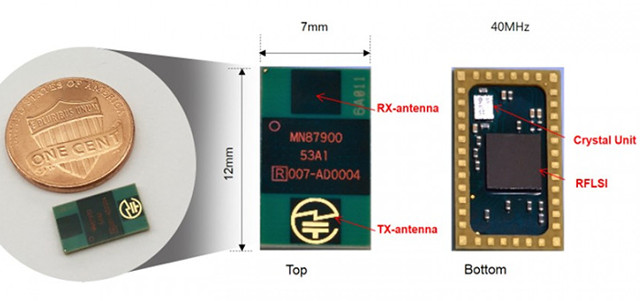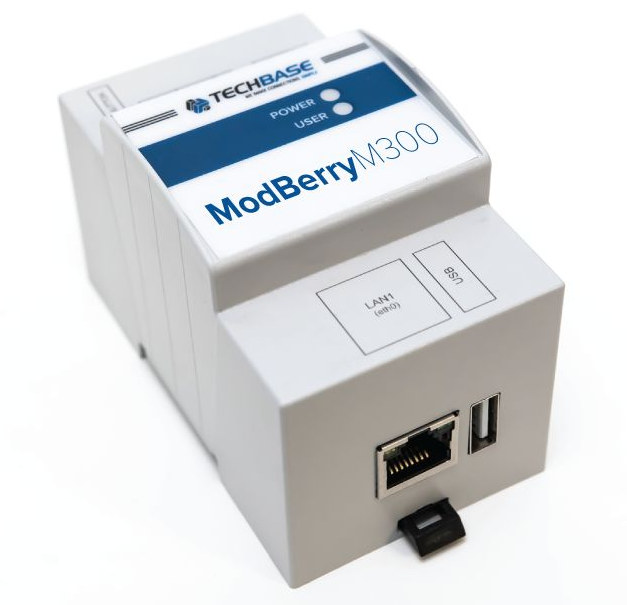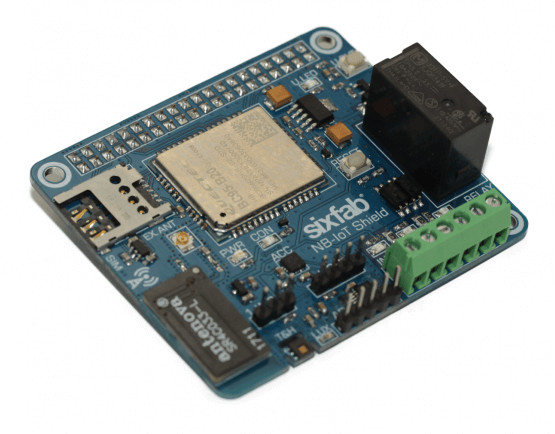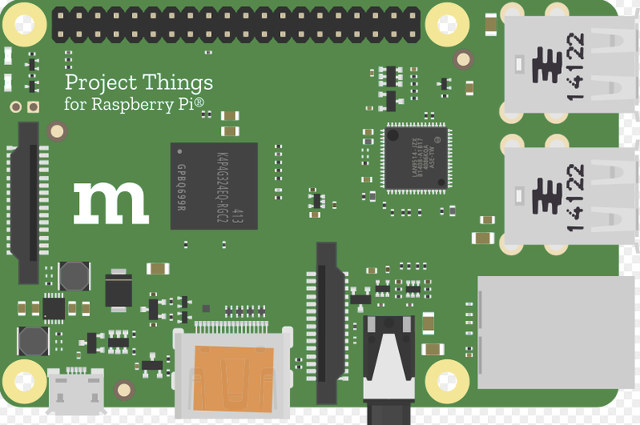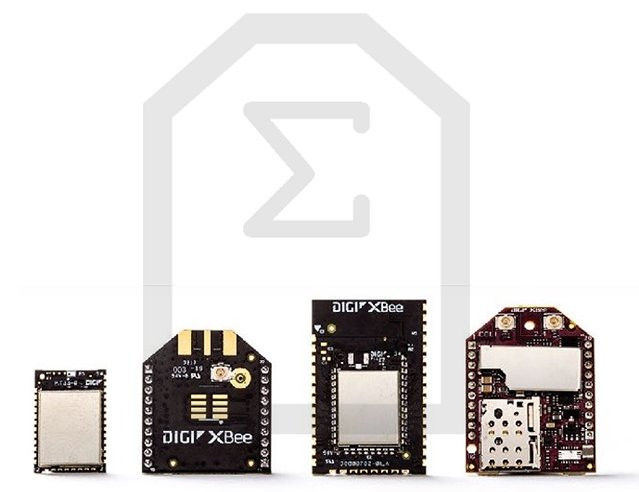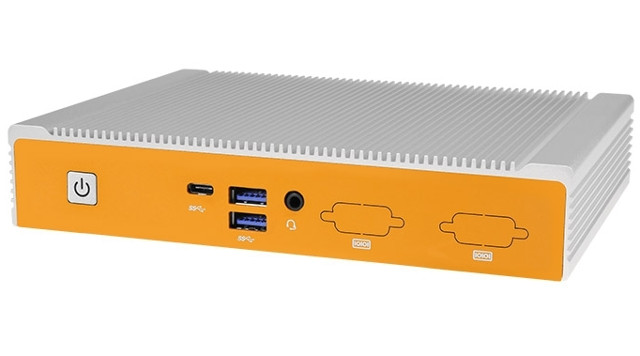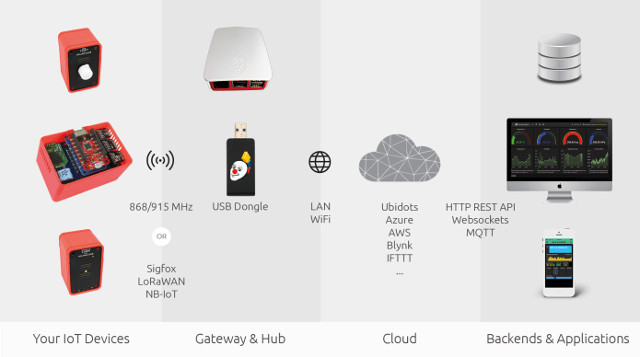In the past, we covered tiny microwave radar modules operating at 5.8 GHz and measuring just 32 x 23 mm. Those modules are normally used to detect motion, distance, and/or direction of movement. Socionext has now introduced MN87900, a single low-power single-chip 24 GHz radio wave IoT sensor solution that even smaller at just 12x7mm with the chip, Tx and Rx antennas, crystal, and 40-pin to solder the module to your board. The solution targets IoT equipments, security systems, smart home appliances, autonomous vehicles and drones, medical devices, and more. SocioNext MN87900 key specifications: Sensor Type – CW, FSKCW, FMCW (moving or stationary) Detection Motion direction – approaching or leaving Motion speed – up to 200 km/h Range – 0.15 to 8 meters 80°@-3dB, expandable to 30 meters with a radome horn, a metal shield that narrows the field of view. Variable frequency width – 24.15±0.1 GHz Transmission Power – […]
TECHBASE ModBerry M300 IoT Gateway Adds Support for NanoPi and Orange Pi Allwinner H5 Boards
Announced at the end of last year TECHBASE launched the ModBerry M300, a Linux IoT gateway powered by FriendlyELEC NanoPi NEO board equipped with Allwinner H3 Cortex A7 processor. The company has now made four extra variants of the gateway with Allwinner H5 quad core Cortex A53 based development boards from FriendlyELEC and Shenzhen Xunlong: Modberry M300 N2 – Based on NanoPi NEO2 Modberry M300 N2+ – Based on NanoPi NEO Plus2 adding 8GB eMMC flash, WiFi & Bluetooth 4.0, and an extra USB port over the N2 model Modberry M300 O1 – Based on Orange Pi Zero Plus Modberry M300 O2 – Based on Orange Pi Zero Plus2 adding 8GB eMMC flash, HDMI, one extra USB port, and Bluetooth 4.0 over the O1 model, but falling back to 10/100 Ethernet, while all three models above come with Gigabit Ethernet To avoid confusion, the original NanoPi NEO model has changed […]
Sixfab Launches Arduino and Raspberry Pi NB-IoT Shields with Four Sensors
SixFab previously introduced a 3G/4G base shield for the Raspberry Pi boards that would take Quectel based mini PCIe card in order to add cellular connectivity to the popular development boards. The company is now back with NB-IoT shields that should better suited to IoT projects with lower hardware and data costs, and support either 40-pin Raspberry Pi boards or Arduino. SixFab Raspberry Pi NB-IoT Shield Specifications & features: Module – Quectel BC95-B20 NB-IoT Module supporting 800MHz frequency (suitable for the European market) Micro SIM card socket, PCB Antenna and u.FL socket for external antenna I/O expansions 4x Channel 12-bit ADC via ADS1015 Relay with optocoupler protection (24V DC, 120-220V AC Switching) 3-pin 1-Wire interface for DS18B20, DHT21, etc… 4-pin I2C interface 3.3V reference voltage Sensors MMA8452Q 3-axis accelerometer HDC1080 temperature sensor (-40 to +125 °C) HDC1080 humidity sensor (0 to 100%) ALS-PT19 ambient light sensor Misc – User button […]
Mozilla Project Things Framework for the IoT Works with Raspberry Pi 3 and Other Boards / Computers
The Internet of Things today relies on many standards, and for example Google Cloud relies on Weave, Amazon AWS IoT and Samsung SmartThings on MQTT, Apple iCloud and so on. The web also relies on many different markup or programming languages like HTML, JavaScript, PHP, Ruby, etc.. but as a user you don’t need to care, and in most cases, you can access any website with the same web browser. Last year, Mozilla started working on Project Things to bring the same ease of of use to the IoT, by implementing the proposed Web of Things standard by W3C that aims to reduce IoT fragmentation by allowing different vendors’ IoT offerings to work together. Mozilla has now announced the release of Project Things “open framework for connecting your devices to the web” suitable not only for hackers and developers, but easy enough to use for end users. The release includes […]
Evercell Thermal Energy Harvester to Power Battery-less IoT Wireless Sensors
In order to be successful the Internet of Things needs to be extremely inexpensive per node, and the problem is that most remote sensors are non powered by batteries, which either needs to be replaced or recharged, which involve maintenance costs. One ideal solution is battery-less IoT sensor nodes, that do not need any battery, and instead rely on energy harvesting. The idea is easier said that done, especially if you intend to do it cheaply. While there have been solutions provided over the years for example using vibration energy harvesting or water flow, battery-less devices are still not that common, but companies still bring new energy harvesting devices to market. One of those is Face International’s Evercell thermal energy harvester that leverages the temperature difference within a material to generate electricity, as long as ambient temperature is above absolute zero. The company plans to manufacture various models of their […]
Digi Introduces XBee3 IoT Modules with New Micro Form Factor, RF and Cellular IoT Connectivity
Digi International has just announced the Digi XBee3 series of RF modules and cellular IoT modules. The modules will be available in the existing Digi XBee SMT amd through-hole form factor, as well as a new micro form factor (19×13 mm) that’s about a third of the size of the original XBee RF module. The RF modules will first come with ZigBee 3.0 and IEEE 802.15 support, but Bluetooth LE will be available through a firmware update later on, and WiFi and DigiMesh version will be brought to markets too. The first cellular module supports LTE Cat.1, but the company will eventually launch NB-IoT and eMTC (LTE Cat M) versions for Europe and the US respectively. Some of the shared key capabilities listed by the company: Over-the-air (OTA) changes to devices in the field for bug fixes and new features Dynamically reconfigurable, based upon situation Establish business rules to aggregate, store, […]
Logic Supply Introduces ML350 Customizable Fanless Industrial Computer Based on Intel Apollo Lake Processor
Logic Supply has just unveiled their latest industrial grade computer with ML350 model that features an Intel Celeron or Pentium Apollo Lake processor, with up to 8GB RAM, two DisplayPorts, up to two Gigabit Ethernet ports, mPCIe and mSATA expansion slots and more. The mini PC is customizable, so when you order you can configure it match your exact requirements, for example you can select the amount of RAM (4GB or 8GB), storage up to 2TB mSATA SSDs, wireless connectivity (WiFI, Bluetooth, 4G), mounting options, and other hardware options. The company can also change the color of the front and back panels and add your own logo though their Rapid Branding program.Logic Supply ML350 (ML350G-10) specifications: SoC (one of the other) Intel Celeron N3350 dual core processor @ 1.10 / 2.40 GHz with Intel HD graphics 500 Intel Pentium N4200 quad core processor @ 1.10 / 2.50 GHz with Intel […]
BigClown is a Battery Powered Modular Wireless IoT Kit for Makers (Crowdfunding)
BigClown IoT Kit is designed to be as easy to use as building a castle from LEGO bricks or an IKEA cabinet. The open source kit is comprised of a coreboard module with STMicro STM32L0 Cortex M0+ micro-controller, and a sub GHZ (868/915MHz) radio for wireless communication, that accepts one or more compatible modules (currently ~30 different options), and communicate to a gateway such as Raspberry Pi or Turris Omnia where you’d connect BigClown RF USB dongle, although it’s also possible to include a Sigfox module for communication, and , LoRa & NB-IoT module appear to be planned. That’s for the hardware…The kit then connects to your chosen gateway via MQTT, which in turns accesses cloud services such as Ubidots, Microsoft Azure IoT, AWS, IFTTT, etc… , and you can monitor the data or control the kit through a web based dashboard or your own application. Core Module specifications: MCU […]


